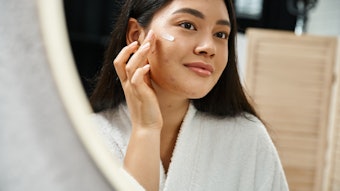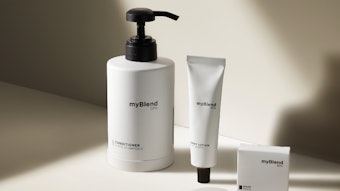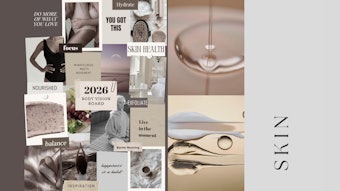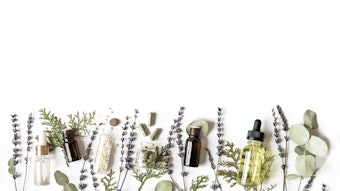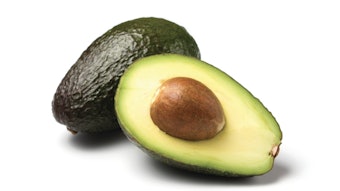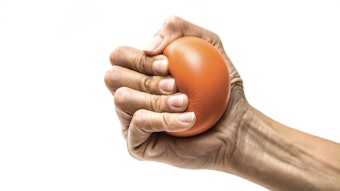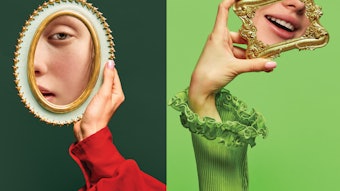We’re fatter than we’ve ever been; at the same time, our idea of the “ideal” body has gone from lean to impossibly leaner. Still, we’re pretty darn pleased with the way we look, a new survey suggests.
In an msnbc.com/ELLE magazine survey, about 60% of men and women alike said they were pretty satisfied with the way they look, thank you very much — even though many of them admit that they wouldn’t exactly call their bodies “ideal.” (It’s worth noting that’s about the same percentage of Americans who are overweight.)
In fact, most of us think we're better-looking than average — between a 6 and a 7 on a 10-point scale — according to the online survey of nearly 26,000 msnbc.com and ELLE.com readers, ranging in age from 18 to 75. The survey was conducted by researchers from UCLA and California State University, Los Angeles.
The under-30s are an especially confident group: 28% of young women and 30% of young men rate themselves between an 8 and a 10.
About 66% of young women and men ("young" is this context means 18 to 30) are somewhat-to-very satisfied with their appearance. That drops a bit for women older than 50, however 55% of older women were happy with their appearance, compared with 63% of older men. Still, 62% of women feel pressured from magazines and TV to have a more attractive body — compare that to just 29% of men who said they felt the same way.
But there's some evidence that people are learning to judge themselves as compared to the peers that surround them; not the airbrushed celebs they see in magazines or on TV. That’s true for young girls at least, showed a study published in the Journal of Health and Social Behavior earlier this year; instead of comparing themselves to models in magazines or celebrities on TV, teenage girls tend to compare their own bodies to their schoolmates’.
“Most people aren’t of that, ‘Oh my god, I have to be a size 2 or I look terrible!’ (mindset),” says Gail Saltz, PhD, a New York City psychiatrist and regular TODAY contributor. “Most people look … and see who’s around them. And most of the people around them aren’t models.”
Perhaps we’re finally starting to realize that so much of what we see on TV, in the movies and in magazines is actually fake. A few women’s blogs — particularly Jezebel — have become sort of watchdogs for Photoshop fakery in women’s magazines. Most recently, the blog attained an untouched photo of Jennifer Aniston, posting the untouched picture next to the airbrushed photo of the actress that appeared in an Australian magazine.
“I think those are great because they really remind people that what they’re seeing in the magazines isn’t reality,” says David Frederick, a psychology researcher at the University of California, Los Angeles, who co-authored the survey along with researcher Kim Elsesser and professor Janet Lever of California State University, Los Angeles. “You’re taking someone who’s already considered really attractive, and then you’re saying, ‘She’s not enough; we have to do more to her.’ So you’re literally creating an impossible ideal. Even the perfect women aren’t perfect.”
And give the perfect body type a decade or two; chances are, it won’t be deemed “perfect” anymore. A 2002 study of nearly 50 years of Playboy centerfolds showed that the models’ curves had shrunk from 1953 to 2001--the typical centerfold had become less “hourglass,” more androgynous. Or picture Meg Ryan in “When Harry Met Sally” in 1989; if that movie were made today, she’d probably be cast as the romantic lead’s chubby best friend.
“Remember when size 6 was small? Size 6 was the size Cindy Crawford was,” says Stephanie Quilao, who’s 43 and lives in Scottsdale, Arizona. Quilao ran the blog backinskinnyjeans.com until a year ago, when she realized that constantly writing about body image was damaging her own.
Turns out, we may be in the middle of a cultural shift right now, the ELLE/msnbc.com survey hints.
More than 44% of women and 31% of men surveyed expressed concern over their muscle size and tone, which surprised the researchers. “We’re all much more fitness-aware. We understand that if you’re going to stay healthy-looking longer … you need muscle,” Saltz says.
The trend toward fitness is encouraging, but “in some ways, it reflects just another way that women are being told to control their bodies,” says Frederick. “You add thing after thing to the list, and this seems to be the new one.”
But can your body satisfaction ever be too good? Maybe, Saltz says; if, for example, someone needed to gain or lose weight for their overall health, a smug sense of self-esteem might hinder them from taking action. “You can have anorexia, which is seeing yourself as fatter than you are. But you certainly can have a distorted body image in any way,” Saltz says. “There are probably quite a few people like this, who think they look sexy, curvy, but are really over the weight limit of healthy weight.”
On that point, Frederick countered: "I think it is very encouraging that some heavier women have started to embrace their curves, and are putting their focus on things like exercise and the positive feelings they have about their bodies, rather than focusing on what the scale says." Regardless of what we think of ourselves, most of us think our partners have it going on. The majority of young women (85%) and young men (81%) were happy with their partner's looks. “The majority of people, even people who were dissatisfied with their bodies, were satisfied with their partner’s body,” Frederick says. “There’s some degree of reassurance that we are our harshest critics.”
By Melissa Dahl, Health Writer, MSNBC.com

